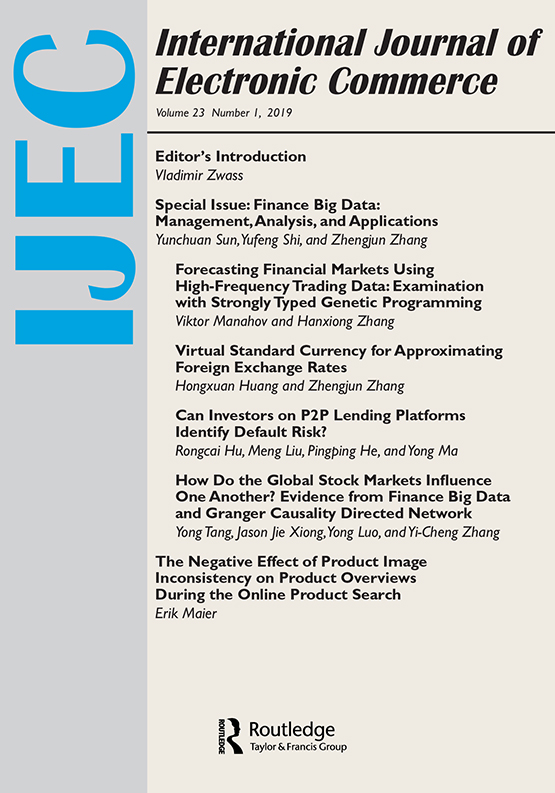Editor’s Introduction
IF 3.8
3区 管理学
Q2 BUSINESS
International Journal of Electronic Commerce
Pub Date : 2023-07-03
DOI:10.1080/10864415.2023.2226897
引用次数: 0
Abstract
The supported, and often steered, bottom-up marketing by individuals on social media occupies a significant place in the firms’ marketing budgets and a highly respectable place in the researchers’ attention. As a component of the co-creation of value by consumers, it may be treated as a financial boon by the producers of goods and services, or managed at a great expense while maintaining the credibility of its independence. This resonant marketing intensifies the entry of the ever new influencers, the deployment of the accumulated longitudinal corpora, and the novel means of making the user-generated content accessible in an attractive form to the consumers and other parties at interest. The new uses of the real-time and the accumulated body of opinion emerge and are worthy of intensive study. The first article in this issue of IJEC does indeed investigate the use of the influencer opinion in the evaluation of the sellers’ responses to the cases when they failed to satisfy consumers. It had been established by prior marketing research and practice that a skillful response to such a failure often leads to long-term positive results for the brand, akin to a bond between the previously complaining consumer and the seller exceeding this consumer’s expectations in response. Anshu Suri, Bo Huang, and Sylvain Sénécal study empirically, with a strong theoretical grounding, the differential response of consumers at a postpurchase stage of their journey to a disappointment with their purchase—depending on the influencers’ opinion of the product. Will the reaction of Consumer A who encounters a positive influencer opinion as the disappointed consumer is trying to form her own opinion differ from the response of a disappointed Consumer B reading a negative opinion of influencers? This research shows that such response is indeed different, affectively and behaviorally. The positive opinion of the influencers matters on this stage as well—in the positive direction for the sellers. The work significantly expands our understanding of the role of influencers in the totality of e-retail. Product reviews reflect, most naturally, product quality. Quality costs money and needs to be congruent with the price and the satisfaction of the desires of the addressed consumer segments. In the face of this vox populi, the sellers need to select the bundle of quality and price to elicit a positive word of mouth online. The online environment also affords the opportunity to dynamically adjust prices and (to some extent and with a latency) quality in response to customer reviews. Here, Cui Zhao and Xiaoshuai Peng offer a formal gametheoretic model in a competitive setting that would allow the sellers to adjust prices and quality in seeking profits while benefiting from real-time consumer feedback online. The practical, as well as theoretical, conclusions of the work show up the potential of the distinguishing features of online selling in successfully addressing the consumer marketplace. A different opportunity to deploy more fully the advantages of the online marketplace is investigated by the authors of the next article, who study the effects of haptic stimulation on consumer behavior. Margot Racot and Daria Plotkina study the effects of tactile stimulation received as the vibrations activated by a smartphone INTERNATIONAL JOURNAL OF ELECTRONIC COMMERCE 2023, VOL. 27, NO. 3, 295–296 https://doi.org/10.1080/10864415.2023.2226897编辑器的介绍
个人在社交媒体上支持并经常引导的自下而上的营销在公司的营销预算中占有重要地位,在研究人员的关注中也占有非常重要的地位。作为消费者共同创造价值的一个组成部分,它可能被商品和服务的生产者视为一种经济福利,或者在保持其独立性的同时以巨大的成本进行管理。这种引起共鸣的营销强化了新的影响者的进入,积累的纵向语料库的部署,以及使用户生成的内容以对消费者和其他利益相关方有吸引力的形式可访问的新方法。实时和积累的意见的新用途出现了,值得深入研究。本期IJEC的第一篇文章确实调查了在评估卖家对未能满足消费者的案例的反应时使用影响者意见的情况。根据之前的营销研究和实践,对这种失败的巧妙回应往往会为品牌带来长期的积极结果,类似于之前抱怨的消费者和卖家之间的纽带,超出了消费者的预期。Anshu Suri、Bo Huang和Sylvain Sénécal在具有强大理论基础的情况下,实证研究了消费者在购买后阶段对购买失望的不同反应,这取决于影响者对产品的看法。当失望的消费者试图形成自己的观点时,遇到积极影响者观点的消费者A的反应会与阅读影响者负面观点的失望消费者B的反应不同吗?这项研究表明,这种反应在情感和行为上确实是不同的。在这个阶段,影响者的积极意见也很重要——对卖家来说是积极的。这项工作极大地扩展了我们对影响者在整个电子零售中的作用的理解。产品评论最自然地反映了产品质量。质量需要花钱,并且需要与价格和满足所述消费者群体的愿望相一致。面对这种vox populi,卖家需要选择质量和价格的捆绑产品,以在网上引发积极的口碑。在线环境还提供了根据客户评论动态调整价格和(在一定程度上并具有延迟)质量的机会。在这里,崔neneneba赵和彭小帅提供了一个在竞争环境中的正式博弈模型,允许卖家调整价格和质量以寻求利润,同时受益于在线实时消费者反馈。这项工作的实践和理论结论表明,在线销售的显著特征在成功应对消费者市场方面具有潜力。下一篇文章的作者研究了触觉刺激对消费者行为的影响,研究了一个更充分地利用在线市场优势的不同机会。Margot Racot和Daria Plotkina研究了智能手机激活振动时收到的触觉刺激的影响《国际电子商务杂志》2023,第27卷,第3期,295-296https://doi.org/10.1080/10864415.2023.2226897
本文章由计算机程序翻译,如有差异,请以英文原文为准。
求助全文
约1分钟内获得全文
求助全文
来源期刊

International Journal of Electronic Commerce
工程技术-计算机:软件工程
CiteScore
7.20
自引率
16.00%
发文量
18
审稿时长
>12 weeks
期刊介绍:
The International Journal of Electronic Commerce is the leading refereed quarterly devoted to advancing the understanding and practice of electronic commerce. It serves the needs of researchers as well as practitioners and executives involved in electronic commerce. The Journal aims to offer an integrated view of the field by presenting approaches of multiple disciplines.
Electronic commerce is the sharing of business information, maintaining business relationships, and conducting business transactions by digital means over telecommunications networks. The Journal accepts empirical and interpretive submissions that make a significant novel contribution to this field.
 求助内容:
求助内容: 应助结果提醒方式:
应助结果提醒方式:


